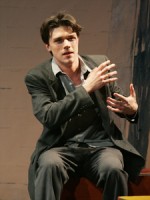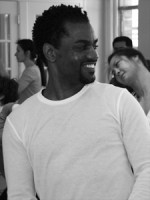Title
Soprano Arianna Zukerman (B.M. ’95, voice) crisscrosses the United States, travels regularly to the Netherlands, Canada, Portugal, and beyond to sing Mozart operas on stage and cantatas, requiems, and Mozart arias in concert. Forging a still-young performing career, she has created a signature style of talking to her audiences about music. She maintains a teaching studio at Catholic University in Washington, D.C. And this past fall she added to this busy mix with the development and launch of myDIVA, a clever soundboard application for the iPhone, filled with razor sharp and LOL-funny sound bytes (sample them at mydivaroars.com) that show off a sense of humor as well as timely business sense.
An idea to put together a choreography showcase turned into an opportunity to create a benefit show, raising $13,000 for a friend in need.
—Lorin Latarro
(Photo by Jordan Matter)'I've learned to be more careful. And I’ve learned that I have many more valuable possessions than money.' —Finn Wittrock
(Photo by Jessica Katz)Body
Lance Horne (B.M. ’00, M.M. ’02, composition), a composer/lyricist/performer/teacher, has just completed his third residency at the Sydney Opera House in Australia with a fourth set for next season. The Emmy Award-winning musician and Juilliard Pre-College faculty member has been performing his own works with Broadway star Alan Cumming on three continents. He claims he has broadened his artistic genres by working with the Boston Pops, singer-songwriter Dwight Yoakam, and the cabaret singer/performance artist Meow Meow, among many others. In 2007, even before the downturn, he voluntarily stopped teaching at New York University, stepped back, and took a calculated look at his overall artistic motives. “I know that I reset quickly as an artist, which is a neat trick,” he said in an interview. “So I pieced together a more variant landscape to see which will take off.”
Lorin Latarro (B.F.A. ’97, dance), a dancer-actress now in her 12th Broadway show, says that even as a student at Juilliard she “had always done choreography side projects and had an idea about putting together a choreography showcase.” In the shaky economy, two “for-sure” Broadway shows fell through. Then a chance meeting with a friend in need turned into an opportunity—finally—for actually doing that showcase of her work as a benefit, raising $13,000 to help her friend, adding producer skills to her résumé, and getting hired as associate choreographer of the upcoming Broadway production of the musical American Idiot, scheduled to open sometime in 2010.
Wait a minute. Haven’t we been stuck in the depths of an economic recession? With unemployment, at almost 18 percent by some counts, higher than most can remember? With existing jobs being slashed by the thousands? With new jobs scarcer than polar bears in the Amazon? And banks failing. Retirement accounts shrinking to the size of piggy banks. Homes in foreclosure. Daily headlines screaming nothing but bad, worse, worst ...
What’s with all this healthy artistic endeavor and chance-taking? How are performing artists managing to hang on? Are they actually even flourishing?
We asked some Juilliard graduates about the state of their artistic lives in this most challenging economic time since the Great Depression. How have they been coping? Were performances and fees down? (Or up?!) Did they have to scramble for jobs at Macy’s just to get the bills paid? Have any changed careers in order to survive? To be sure, some told of close calls, major upheavals, work droughts, or shifts in plans. But surprisingly (or perhaps not) nearly all—even those feeling some pain—formed their answers with words like resilience, reinvent, re-engage.
Yes, Zukerman and others say, the numbers aren’t very pretty: “Everyone I know has had fees cut and contracts canceled. But it’s like after 9/11, when the landscape for the arts, especially for those of us coming up, changed. We had to regroup then—and now. I am not the diva of yesterday. And I thought poking a little fun at what I do—dressing up in tights and breastplates and making really loud noises?!—in three-second sound bytes might get at least one new person into the opera audience.” And Horne, re-evaluating his career, has gotten even more pragmatic, weighing each potential gig in artistic, emotional, and financial categories. “I decided that it has to weigh positive in two out of the three for me say yes. I also have started making a budget—that’s new, to think about what I need each month,” he says.
Mezzo-soprano Stephanie Houtzeel (M.M. ’95, voice), after more than a decade of working steadily in Europe, had moved back to the United States with her husband and their young child in 2007, hoping that New York would be a permanent home. But, in 2009 she said yes to a three-year contract from the Vienna State Opera. “The timing was awful,” she admits, because her husband was in the middle of fund-raising for his U.S.-based period-instrument orchestra. “We were feeling a lot of stress with opportunities [shrinking]. And then I got that call—because the manager had heard me in Der Rosenkavalier in Graz. We won’t be cutting our ties over here,” she says, even as she packs up their Brooklyn apartment. “But being willing to go outside the box a little bit can be helpful. And I ammaking my living as a singer, which has always been my standard.”
None of this surprises Juilliard’s president, Joseph W. Polisi. “When students come to Juilliard, they have already decided what they want to be,” he says. “They are dedicated to their art and their life in the arts. The art is really their life, as opposed to, say, people in the financial world whose life is all about money.” Determination is already built into the work ethic and character of most artists and, Polisi says. “That includes a determination not to walk away. Even in this exceedingly severe downturn.”
Right out of Juilliard four decades ago, choreographer-dancer-teacher Saeko Ichinohe (Diploma ’71, dance) formed her eponymous company, which infuses contemporary dance with the culture and tradition of her native Japan. Almost immediately the ensemble was off to Norway and then danced through a multination Asia Society tour. She later founded an annual Cultural Bridge Award that has honored the Tokyo String Quartet, producer Harold Prince, Maestro Kurt Masur, and others who have “contributed to the cultural exchange between the U.S. and Japan.”
Although she says the award for 2009 was been “postponed until the economy improves” and the dance company cut its annual performances drastically, she inaugurated a community service program. “Our seed money came from Toyota Motor North America,” she says, “so that we can present free performances with audience participation” in underserved areas of the five boroughs of New York City.
“One thing we have worked very hard on at Juilliard is investing in an entrepreneurial spirit,” Polisi says. “We want students to go off at home and around the world and start these special programs—for hospitals, community centers ... Get out of your comfort zone and take your art elsewhere.” Even in good times, he says, “there can be a misconception of walking into a job after graduation. But the artist always has economic challenges. There are ways of dealing with the recession by broadening the palate of opportunities. What is your skill set? What are your interests—teaching, administration? Where in your city are there not traditional arts presentations?”
At Kean University in Union, N.J., Anthony Scelba (D.M.A. ’76, double bass) chairs the music department, managing the responsibilities with an articulated skill set that includes negotiating campus politics and administration as well as musicianship. In 1998 he initiated the Concert Artist Program (CAP) that has three components: campus performances, teaching, and community outreach. Scelba had been able to hire up to 20 musicians for this program, with few budget constraints, and happily anticipated the addition of a stunning new chamber-music performance space, Eugene and Shelley Enlow Hall, on campus. However, with that opening scheduled for fall 2009, the budget axe fell. Not on the hall itself but on CAP, which had been slated to keep the venue filled with music. “The hall, the Fazioli-F309 and Hamburg Steinway-D concert grand pianos, were already funded. But the university said we had to somehow absorb a 50 percent cut in artist pay and concerts,” he says, with a tone more of determination than resignation.
Scelba applied his savvy. “The way you express a budget has everything to do [with] whether you want what’s in the budget. I was actually able to keep all the artists and pay them [per service] for what they do, although with fewer outreach opportunities and no summer private lessons or programs, some are taking what amounts to pay cuts.” To promote concerts he leaned on the campus marketing department for a plan and pro bono brochure design, and found a publicity intern who “turns out to be fabulous.” The season is now at 12 concerts (down from 20), yet attracting standing-room-only audiences “who have never heard music in such a special place. If demand is there we will grow again.”
In bad times (and good) to move along to your career goals, “you do need to capitalize on more than one skill,” says Courtney Blackwell, director of career services at Juilliard. Graduates and students who would like help spinning together the practical threads so necessary for artistic and financial gain are welcome to make an appointment with Blackwell and her staff of two. Or just knock on the door. “Besides appointments, we have three or four walk-ins every day. And we are here to help with strategy and skills for finding performance opportunities and promoting them. That could be setting up a Google page, borrowing a video camera, editing video footage, sharpening speaking techniques ... Or just housing credentials files—letters of recommendations and résumés.”
Blackwell notes creative ways of finding work when work is scarce. “One alum is marketing her performances by using her different cultural background for new audiences and venues. Another has made the revival of salon performances in [private] homes his specialty. Others have tried working as interns in arts administration to explore that area and see what it takes. And being part of an interdisciplinary group that uses performance and teaching in schools for social interaction can open new doors,” she says. “Network. Create your own opportunities. Embrace technology, especially as it relates to art.”
“The business sector does affect us.” But, she advises, don’t wait for the stock market to reach a steady climb into the ether. Take a plunge-in-now approach. Which is what choreographer/artistic director Ranardo-Domeico Grays (B.F.A. ’92, dance) did. And cellist Elinor Frey (M.M. ’05, cello).
“I have always been known as the dance teacher who preaches,” says Grays. “I wanted to choreograph. And I wanted to share with others.” So in 2005, with no funding and no board, he founded Visions Contemporary Ballet and started building his dream. “It’s learn-as-you-go for me,” he says. He has to find appropriate rehearsal space which “can be tricky because we wear pointe shoes.” And then negotiate below-market rates, maybe “$10 an hour with a state grant. I continue to apply for grants.” Meanwhile he takes acting jobs to help support the company. And teaches—“those who can teach should teach!”—including a popular Urban Fusion class at studios and health clubs around the New York area. “I was scouted on Facebook, and that is a great way to make connections. But I am finding it harder to ask for contributions in this economy because so many people have lost their jobs.”
When the economy began its nosedive Elinor Frey started applying for grants “as a backup,” she says. She was awarded a Fulbright, which has allowed her to do “what I always imagined.” That includes studying in Italy and lots of reading. “And the money just appears in my bank account, which is an awesome thing. When the economy is so up-and-down it’s a temporary foundation of security. Since I am not the panic type I had also taken Suzuki teacher training at Juilliard so I could move anywhere to live and teach. But my main focus now is on being a performer, mostly in recitals and chamber music. Although my long-term goal is to be a tenure-track professor of cello. I guess you could say the economy going bad really helped my future.”
Unfortunately, not everyone is able to say that—at least not in such a positive way. The learning curve for actor Finn Wittrock (Group 37) was not only swift, it came at a steep cost. Yet, he is first to say: “I am a smarter person for it.” Between acting gigs he searched Craigslist for tutoring jobs. And found one—or so he thought. Turned out to be a lead for a scammer with a check-cashing scheme who headed straight for Wittrock’s already slim bank account. “I’ve learned to be more careful. And I’ve also learned that I have many more [valuable] possessions than money. And I became thankful for the less transient things in life.”
Also in the loss column, at least at first glance, is singer-actor Richard Adams (M.M. ’00, voice), who came to terms with putting his New York City apartment for sale at a low point in the market. He, too, says right away, “I could be in a much worse situation.” Recently married and a new father, he figures that selling and moving to New Jersey might have been the plan anyway. But it all sort of hit at once. With enviable Broadway star credits (“I actually took a leave from Juilliard to tour with Phantom of the Opera, and saved up a lot of money then”) he wanted to make a career transition into concert work, which, he says, is gradually picking up. “Many theaters have shut down temporarily or permanently, so the talent pool swelled. I told my agent I am totally fine with taking stand-by work now. But what has been most scary is health insurance. The cost for a dependent sort of took me by surprise. And for two dependents it’s even more.”
Another singer with a young family, Andrew Milligan (M.M. ’99, voice), had decided a decade ago to make a transition—actually more of a leap—completely out of the arts to the corporate structure of IBM, going on to become a social entrepreneur. “Believe it or not, though, my time at Juilliard was perfectly instrumental in preparing me for the work I do now. I learned the valuable skill of building relationships and asking for advice and guidance. I learned the value of hard work. I learned the blessing and freedom of being myself. I learned lessons about artistic integrity and honesty. And, from Joseph Polisi, I learned about our shared civic responsibility as artists and as human beings.”
Milligan has been applying all this knowledge to the Almus Project, a nutrition and feeding program he started in southern Africa that helps build factories producing ready-to-use therapeutic foods. With massive layoffs hitting IBM in February 2009, he took on the project full time, “solidifying partnerships to bring nutritious food to people, including malnourished children and H.I.V./AIDS patients, who desperately need it.”
“In spite of economic uncertainty, I have followed my passion to make a difference in the lives of others,” Milligan says. “And the lessons learned at Juilliard have served as a launching pad for my own full and rewarding life.”







